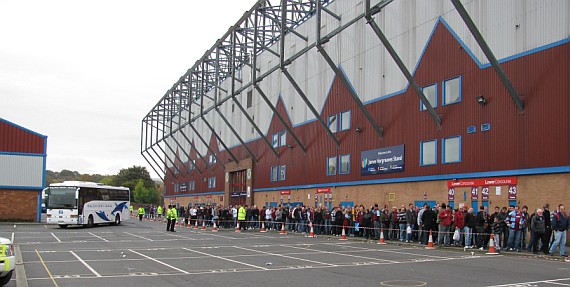|
And, even if a small cloud does temporarily blot out the sunshine after Sunday's disappointing Derby defeat at Ewood Park, the sheer nature of the game confirmed that Burnley have well and truly emerged from those dark and dingy corners.
Hell, the first top-flight East Lancashire Derby was broadcast not only to the United Kingdom, but to every corner of the world. It captured the attention of the media in this country and further afield, most of which was previously blissfully unaware of the tradition and pride of this most historic of fixtures.
And, as if to underline the new found profile of the fixture, the East Lancashire Constabulary launched a police operation worthy of Stalinist Russia.
Despite all the furore initial news of their draconian intentions provoked, it took a while for anyone in the know to explain the reasons behind the decision. In the end, that clarification came in the shape of a statement which informed us that, ""Every game has to be evaluated on its own merits, looking at safety of spectators, travel arrangements and intelligence-led policing."
That didn't really make sense: rather than regarding these as three, equal and independent factors, one would have thought that travel arrangements would be determined to ensure crowd safety, on the basis of police intelligence. Perhaps this was what they meant, and the whole exercise was the result of some advance police information.
But if that was the case, then obviously no-one bothered to inform Superintendent Chris Bithell, who announced in the Lancashire Telegraph last week that the police had no such intelligence of any pre-planned violence. Perhaps, at some point, someone will explain to us all how those two statements can be reconciled.
Anyway, all of this nonsense meant that I opted out of the trip to Ewood Park and found myself in a pub in South Manchester for the match instead. Lively, it was, too: I didn't realise there were so many Clarets living in that part of the world. And it was even livelier when Blake put Burnley ahead after 5 minutes.
It wasn't to last: the rest of a half in which most of the defensive frailties which have blighted the Clarets on the road were laid bare saw to that. Before we knew it, and before Brian Jensen had made a proper save, we were 3-1 down. The mood at the bar at half time was sombre. By the time Chris Eagles reduced arrears way, way too late in the day, it had changed to resignation, tinted with relief that the afternoon had not turned into another hiding. After a couple of minutes of hoping against hope for a miracle, the game had finished 3-2.
|
But for all Blackburn's first half pressure, just as in the grim and gutsy performances against the likes of Reading and Sheffield United in the final throes of last season, Rovers were prevented from creating too many chances other than the three goals and one shot which Diouf dragged wide. Had Graham Alexander reacted and closed down David Dunn on 9 minutes; had Robbie Blake not needlessly tripped Jacobsen to set in train the calamitous chain of events which led to the second goal; had Burnley held out until half time just one goal adrift, as they looked set to do before Pascal Chimbonda surged onto Pedersen's knock-down...without any of these events, perhaps Burnley would have been able to silence Rovers and hold out for a win, or regroup and go on to claim at least a point.
Yet these are the margins which decide Premier League games, and Burnley simply cannot afford to continue to give away the sorts of avoidable goals which appeared to have been cut out for good during the second half of last season. The Clarets must also find a way of combating the threat posed by the clever movement of players like Deco, Kuyt, Keane and now Dunn, who play in between defences and midfields - but that perhaps owes more to experience and sophistication than simply picking up a runner down the right flank.
Still, it was a good game of football. And despite the attempts of the local authorities to overshadow the game by providing the nation with a negative image of a region where rival supporters cannot be trusted to come into contact with one another, you sense the more positive message won the day: the notion has been instilled in people's minds that there are old, traditional clubs who remain financially self-sufficient thanks to the support of genuine supporters and which have remained at their traditional homes in the heart of their communities. And the thought has been planted, I think, that there might not be enough of these clubs, these fixtures, in English football these days.
You can have your millionaire, mid-season takeovers, your attempts to deliver survival or success on the patronage of an outsider. But it isn't your club which achieves success: that accolade belongs to whoever it is who has been allowed to hijack the goodwill which attaches to the name of the club. The club itself, with its characters and its atmosphere, becomes practically irrelevant.
Burnley and Blackburn remain football clubs in the true sense of the expression. In Sunday's limelight, it was clear that, for the first time in many, many years, both clubs have a real relevance at football's top table. And there was enough quality on show from both sides to suggest that, with a little tightening up, it can become a regular institution in the Premier League. If only the Old Bill would allow us to enjoy the whole occasion properly, then that really could be something to savour.


